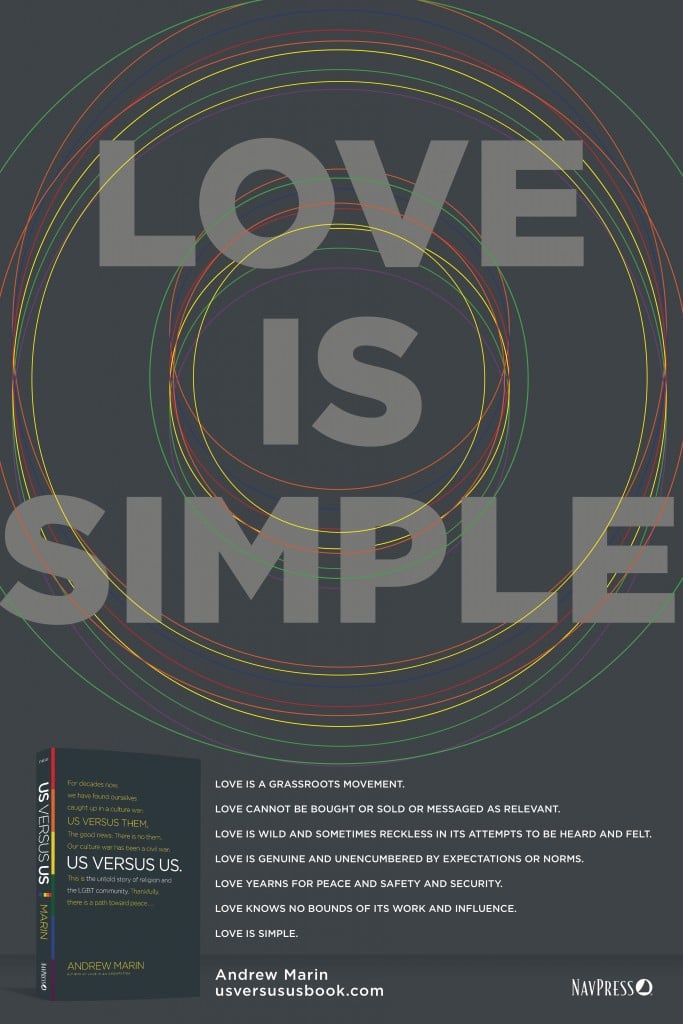The following post is by Jason Bilbrey, our Director of Pastoral Care here at The Marin Foundation. You can read more from Jason at his blog, www.jasonbilbrey.com or follow him on Twitter at @JasonBilbrey.
“I’m not a big fan of–you know…labels.” That was my mom’s response a few weeks ago when I asked if she considered herself a feminist.
“What do you mean?” I asked.
“Well, I’ve never been very comfortable with that term. For some people, especially of my generation, it seems to have some negative connotations that I’m not sure I want to be associated with.”
There’s a certain irony in hearing the word “feminist” rebuffed by the very woman who inspired my own adoption of it. What my mom sees as an unwelcomed and uncertain set of loyalties to a cause, I see as a basic acknowledgement of gender equality, illustrated everyday by billions of women like her (I’m a proud feminist, but that’s a post for another time).
Labels are tricky. On the one hand, they can be incredibly useful as tool for self-definition and community-affiliation. This was my wife’s attitude toward the word “bisexual.” Finally, she had a label that helped make sense of her experience and connect her to a community of like individuals.
On the other hand, labels can be oppressive. My wife and I tend to feel this way about the term “mixed-orientation couple” or “mixed-orientation marriage.” Technically, my wife and I fit that description; she’s bi and I’m straight. But the term seems to imply a conflict of sexual orientations that is absent in our relationship. So it’s not a particularly useful label for us.
It really comes down to agency. When labels are used as a tool for self-identification, the agency remains entirely with the individual. When labels are used as a system of classification imposed on individuals by others, the agency is stripped from the individual.
I remember talking with a guy a few months ago. When he and his wife were married a few years ago, both identified as lesbian women. Then, about a year into marriage, he transitioned to male. A big part of their journey was figuring out the right labels to adopt. For the guy I was talking to, identifying as a man meant that “lesbian” didn’t really fit anymore. He had never really felt like a lesbian, and after transitioning he finally felt the freedom to identify as “straight.” That’s what he had felt all along.
His wife had a different perspective. She loved her partner and was fully supportive of his transition. But the term “straight” didn’t feel right. She didn’t feel “straight.” “Lesbian” didn’t seem right anymore either, but it’s not as if her orientation had somehow changed since they were married. She settled on the term “queer,” an umbrella term that acknowledged her not-straight orientation while also, she felt, keeping ties with the LGBTQ community, an important part of her life.
I’ve talked with many people who identify as same-sex attracted and who are very uncomfortable with the term “gay.” I know many people who identify as gay and who despise the term “same-sex attracted.” Labels are often hard-won and in constant need of defense against misinterpretation. (Just look at Eliel’s excellent post about bisexuality last week.)
The healthiest and most effective use of labels I’ve ever seen was in the documentary “(A)sexual.” It’s on Netflix. Find it. Watch it. It centers around a guy named David Jay who more or less invented the term in 2002 to describe his own lack of sexual attraction to anyone at all, ever. His website, AVEN (the Asexuality Visibility and Education Network) attracted thousands of people around the world whose own experience paralleled his. “I thought I was the only one,” one woman said in the documentary. “Finding AVEN gave me a name for what I had always experienced but could never explain.”
We watched this documentary at one of The Marin Foundation’s biweekly Living in the Tension gatherings. During the discussion afterward, I remember one individual, who identified as asexual, say that finding the term made him feel so validated. “It’s like someone finally gave me permission to exist.”
I cannot imagine a more ringing endorsement for labels. At their best, they can catalyze communities, validate experience and define one’s sense of self. How someone identifies is not up for debate. Ever. That’s one of our guiding principles here at The Marin Foundation. It goes back to the cultural humility piece I talked about in my last blog post. People are the experts of their own experience. We should let them be.












